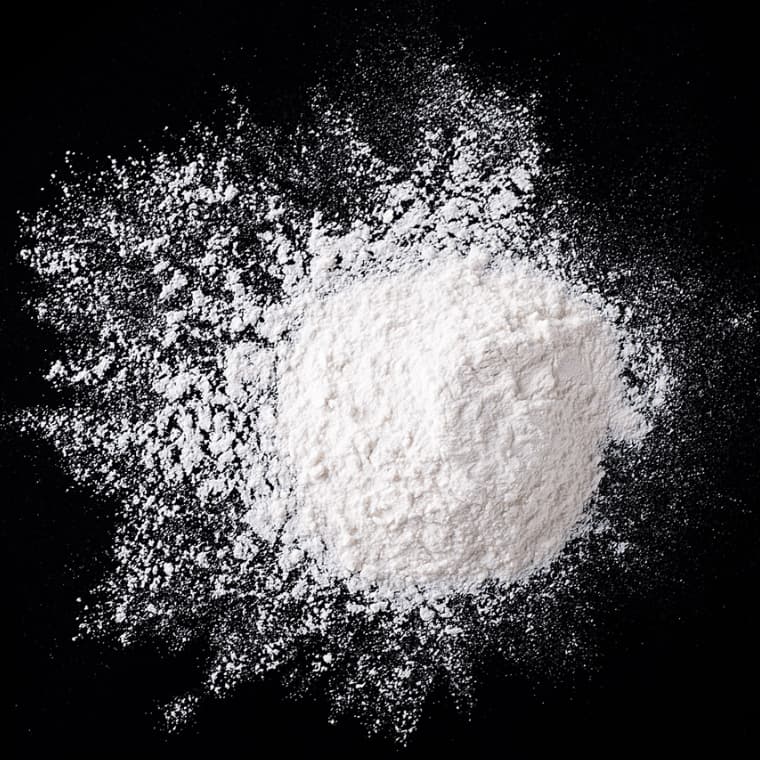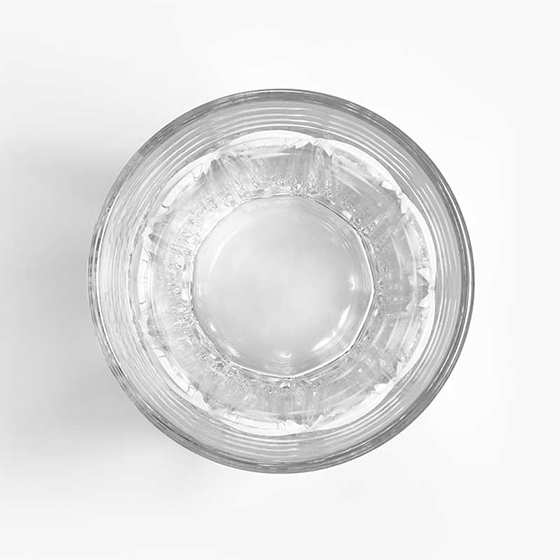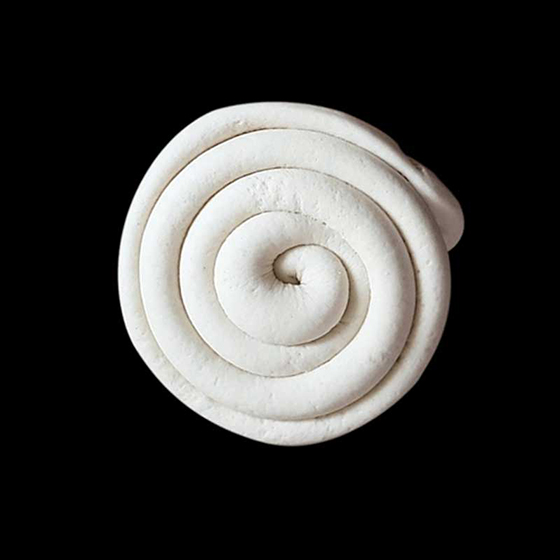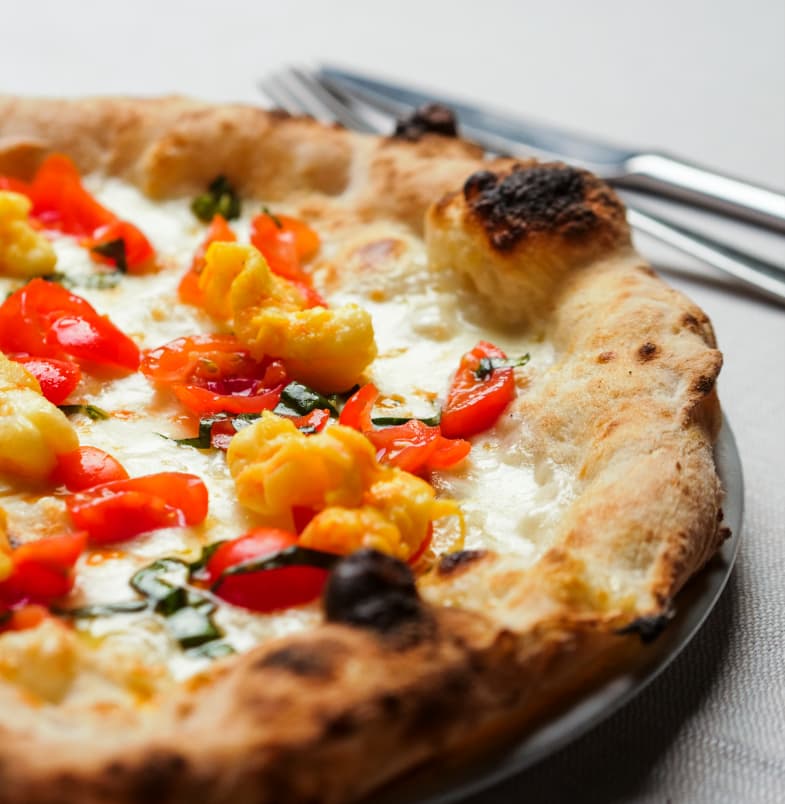INGREDIENTS
to make
a good dough
new experiences in taste, thanks to excellent ingredients sourced from all over Italia and Slow Food projects, with special regard for our own wonderful Marche region







Our one-metre and mezzometro® half-metre pizzas are made from ‘pale alla romana’ mixed leavening dough (mother dough plus brewer’s yeast), blended with certified pure stone-ground Petra 1 flour. Noble bran, wheatgerm, a high level of hydration and slow maturation result in a product that is natural, tasty and easy to digest.
dough
This is a long maturation dough. We use Petra top-quality, milled, type O wheat flours and brewer’s yeast. The integration of 100% natural Bonsemì (a mix of sunflower, sesame, line, millet, OGM-free soya grits and rye) adds fibre and protein to this dough, giving it extra nutritional value.

There can be no mistakes when health is at stake. That is why our gluten-free recipes are prepared according to the strictest standards and served on plates of a different shape and colour. All our pizzas are available in gluten-free and lactose-free versions.
Buon appetito!
BEST
GLUTEN FREE PIZZERIA
IN ITALY 2018
The Alliance is an international network of chefs committed to valorising Slow Food and Ark of Taste products and small, local “tasty, clean and good” foods in general. Members are committed to safeguarding the biodiversity of livestock and cultivars at risk of extinction by promoting the value of the producers from whom they obtain their supplies.
The projects in question are Slow Food projects that
safeguard the small-scale production of varieties in need of protection
and promote traditional farming practices.
The Ark of Taste is a catalogue of products belonging
to cultures and traditions from all over the world
at risk of disappearing.

Luca Angeli - Pieve Torina
This pecorino cheese from the Marche region is produced according to local traditions. Fresh milk is heated to around 37°C in a copper cauldron, then natural rennet is added. The curd breaks after a half an hour then the cheese is reheated to around 45-48°C and placed in moulds. The cheeses are then pressed, salted and dried for two days. The cheese is aged for at least two months before eating. It has a strong, aromatic fragrance and often smells of mushrooms and truffles. The flavour is decisive, spicy and very persistent.
Daniela Virgona - Malfa Isola di Salina
These capers from the island of Salina to the north of Sicily are picked between late May and the end of August. They are dried in the shade on sheets of jute and then salted in special barrels using large grain sea salt. They are ready to be eaten in about one month. Salina capers are used in various Sicilian fish dishes and to add character to traditional recipes like caponata.


Portonovo Fisherman’s Cooperative - Ancona
Portonovo wild mussels or “moscioli” grow on submerged rocks along the Marche region’s Conero coastline. They can be eaten freshly picked without condiment, or “alla marinara” with garlic, parsley, olive oil and pepper. Mussel fishing is rigorously controlled to maintain the right balance between the quantity removed and the mussels’ ability to reproduce. This ensures sustainability and allows the ecosystem to regenerate itself.
Prodotti Ittici Nettuno di Vincenzo Giordano - Cetara (Sa)
This anchovy sauce derives from what the Romans once called “garum”. It is made by salting anchovies in oak barrels according to a traditional Cetara fishermen’s technique. After 6 to 9 months, the precious and concentrated juices from the anchovies are drawn off from a hole in the bottom of the barrel. The end result is a clear, mahogany-brown liquid with a full-bodied flavour and with the full aroma of the raw materials.


La Bona Usanza Cooperative - Serra de’ Conti (AN)
This ancient legume, once common throughout the Marche region, had almost disappeared a few years ago. It has been rediscovered recently thanks to the hard work of a group of young farmers from Serra de Conti. The beans are sown in the spring and harvested in August. The plants produce small beans that are ideal for making soups and can also be turned into purée or served as an accompaniment to zampone.
I Lubachi Farm - Fratterosa (PU)
The beans grown in Fratte Rosa, a small town in the Pesaro hills, are unique in that they flourish on fields rich in white clay, called "lubachi". The beans are sown in October and are ready for picking early in May. They can be consumed fresh or dried, used as ingredients in many traditional recipes, transformed into flour and mixed with wheat flour to make bread and be used to produce “tacconi", a variety of pasta typical of Fratte Rosa.


Sapori Mediterranei - Cidigliano (Mt)
This salami is typical of the forests of the Matera mountains and middle reaches of the Basento river in the heart of Basilicata. It is made from the meat of “Nero di Lucania” pigs. Pezzente is made from the poorer cuts of pork, seasoned with sweet Senise pepper or spicy pepper, wild fennel, fresh garlic and sea salt. It can be eaten in slices along with good home-made bread. It is also excellent as an ingredient in “red sauce” and can be eaten with greens like chicory, chard or escarole.
These long-keeping cherry tomatoes are cultivated in the area around Mount Vesuvius where they are known as ‘spongilli’ or ‘piénnoli’. They are sown in March-April and are ready for harvesting between July and August. They can be preserved until the winter or even the next spring by hanging them in rooms of suitable temperature and humidity. They are excellent for flavouring fish dishes, pizzas and traditional pasta dishes. They are also delicious in carne alla pizzaiola and in quick-cooking sauces.


The characteristic ‘nduja spicy salami is made in Spilinga, at the feet of Monte Poro in the province of Catanzaro. ‘Nduja is made exclusively from fattened pigs of no less than 14 months. Second choice cuts are chopped fine with knives. A little salt and a lot of chili pepper are the only condiments added. The mix is stuffed into pork intestine, smoked, then cured for one year. ‘Nduja is delicious spread on crusty bread, added to pasta and as a flavouring for many dishes.

Mezzometro® is a partner of
birrificiole fate
The Le Fate (The Fairies) brewery takes its name from an old legend that tells of wizards, warriors and fairies. In the stories of Andrea da Barberino and Antoine de la Sale, the fairies belonged to the court of Sybille and lived with her in a cave known as “Fairy Cave” on Mount Sybille. The refined tastes of these artisan beers are the result of a determination to promote the Sibylline Mountains and to find a typical, local flavour that can satisfy the international market. The brewery produces eight different beers, identified by eight different fairies. All the flavours are inspired by the same concept of blending Sibylline mountain fruit flavours with international beer tastes and characteristics.